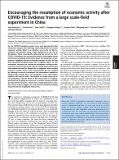Encouraging the resumption of economic activity after COVID-19: Evidence from a large scale-field experiment in China
Author(s)
Palacios, Juan; Fan, Yichun; Yoeli, Erez; Wang, Jianghao; Chai, Yuchen; Sun, Weizeng; Rand, David G; Zheng, Siqi; ... Show more Show less
DownloadPublished version (1.036Mb)
Publisher Policy
Publisher Policy
Article is made available in accordance with the publisher's policy and may be subject to US copyright law. Please refer to the publisher's site for terms of use.
Terms of use
Metadata
Show full item recordAbstract
As the COVID-19 pandemic comes to an end, governments find themselves facing a new challenge: motivating citizens to resume economic activity. What is an effective way to do so? We investigate this question using a field experiment in the city of Zhengzhou, China, immediately following the end of the city’s COVID-19 lockdown. We assessed the effect of a descriptive norms intervention providing information about the proportion of participants’ neighbors who have resumed economic activity. We find that informing individuals about their neighbors’ plans to visit restaurants increases the fraction of participants visiting restaurants by 12 percentage points (37%), among those participants who underestimated the proportion of neighbors who resumed economic activity. Those who overestimated did not respond by reducing restaurant attendance (the intervention yielded no “boomerang” effect); thus, our descriptive norms intervention yielded a net positive effect. We explore the moderating role of risk preferences and the effect of the intervention on subjects’ perceived risk of going to restaurants, as well as the contrast with an intervention for parks, which were already perceived as safe. All of these analyses suggest our intervention worked by reducing the perceived risk of going to restaurants.
Date issued
2022-02-01Department
Massachusetts Institute of Technology. Center for Real Estate; Massachusetts Institute of Technology. Department of Urban Studies and Planning; Sloan School of Management; Massachusetts Institute of Technology. Department of Brain and Cognitive SciencesJournal
Proceedings of the National Academy of Sciences
Publisher
Proceedings of the National Academy of Sciences
Citation
Juan Palacios, Yichun Fan, Erez Yoeli, Jianghao Wang, Yuchen Chai, Weizeng Sun, David G. Rand, Siqi Zheng, Encouraging the resumption of economic activity after COVID-19: Evidence from a large scale-field experiment in China, Proceedings of the National Academy of Sciences Feb 2022, 119 (5) e2100719119
Version: Final published version
ISSN
1091-6490